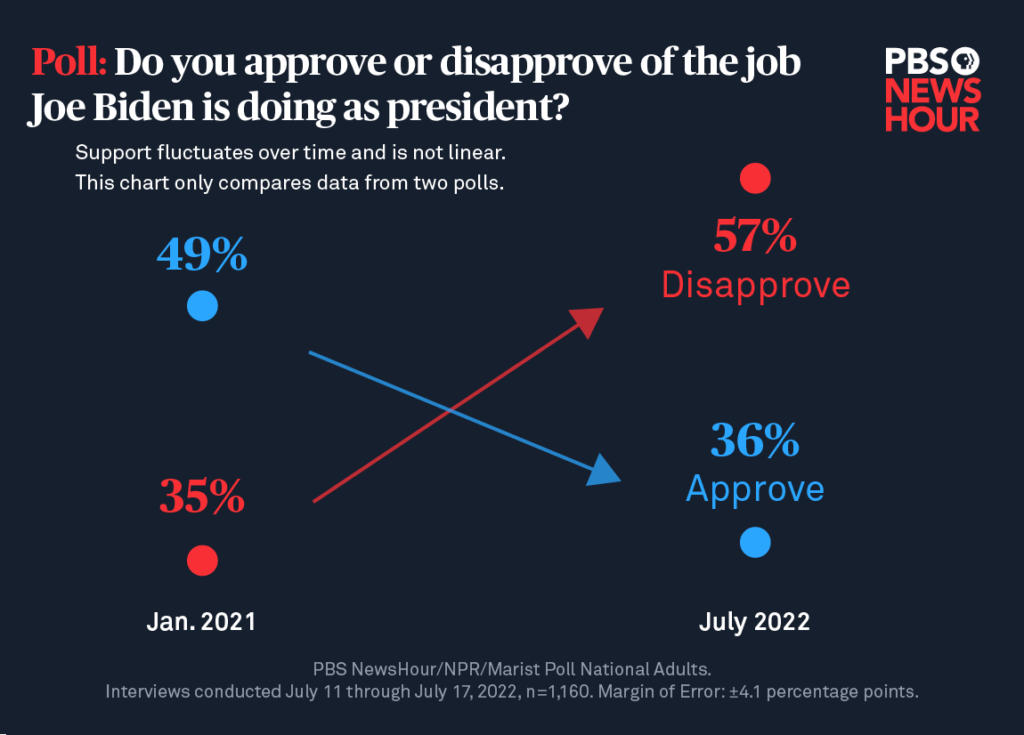
by Carl Nelson
According to Reuters, Biden’s approval ratings are currently at 40%. I’ve had to wonder how badly can a party and a candidate perform before their approval rating hits the single decimals? Could there be a worse performance than Biden’s? And if so, what would the approval rating be then? Thinking this, I posted the following comment on Facebook and got a few interesting replies:
Me: I’m becoming to believe that even in the worst of times there will be thirty percent of the citizens who cannot see the reality for what it is. I wonder if in Mao’s, or Stalin’s, or Hitler’s era, whether thirty percent of the citizens still believed they were being led well?
Thom Linken: It’s higher than 30%, certainly in Germany during the Hitler regime. In my family I know of only one person, my maternal grandmother, who was against Hitler start to finish. My mother on the other hand required extensive reprogramming despite the bombings, losing her first husband on the Russian front and knowing about the concentration camps.
Bill Hudgins: I’m reading They Thought They Were Free, written by an American journalist who befriended 10 Germans in the early 50s. It deals with the whole issue of complicity, remorse and self-understanding. I recommend it.
Thom: I’ll check it out. It seems to me that a sizable number of people must have supported the Hitler regime even after the war and needed “reprogramming” who perhaps were ordinary and humane in their daily lives. Political views become ossified. People sometimes hold onto partisan views despite great evidence to the contrary, which suggests either they cannot accept the humiliation of guilt or that their partisanship arose out of a strong emotional connection – perhaps identification with a group or through the influence of a beloved parent. The refusal to engage in argument or to weigh facts is a puzzle I’ve seen in court, too.
Bill Hudgins: I recall a study that showed the “evolution” of German self-understanding. Immediately after the war people were frank and open about their support for and involvement in the regime. It wasn’t until the fifties that rationalizations and denials slipped into the narrative.
- Like
- Digg
- Del
- Tumblr
- VKontakte
- Buffer
- Love This
- Odnoklassniki
- Meneame
- Blogger
- Amazon
- Yahoo Mail
- Gmail
- AOL
- Newsvine
- HackerNews
- Evernote
- MySpace
- Mail.ru
- Viadeo
- Line
- Comments
- Yummly
- SMS
- Viber
- Telegram
- Subscribe
- Skype
- Facebook Messenger
- Kakao
- LiveJournal
- Yammer
- Edgar
- Fintel
- Mix
- Instapaper
- Copy Link









3 Responses
This was an interesting observation! Clearly, people are often lead by what they are told, not by what they see. Empirical experience does not necessarily convince. I had an uncle who spent seven and a half years in Gulag (he was sentenced to 15, but got “amnestied” when Stalin died). One would have naturally expected him to hate Stalin with a passion — but no, in fact he strongly approved of Stalin — nay, admired him — till the end of his life. I couldn’t understand that. His excuse was, “such were the times.” My response was, “there are no ‘times’ — there are people who are bad.” I might have as well spoken to a wall. We people are weird.
Wow.
Superb!